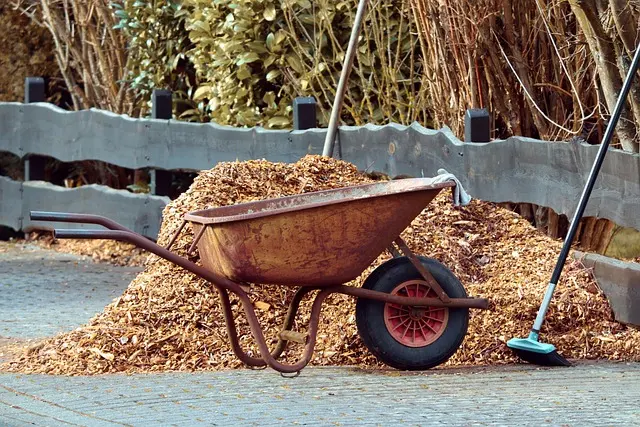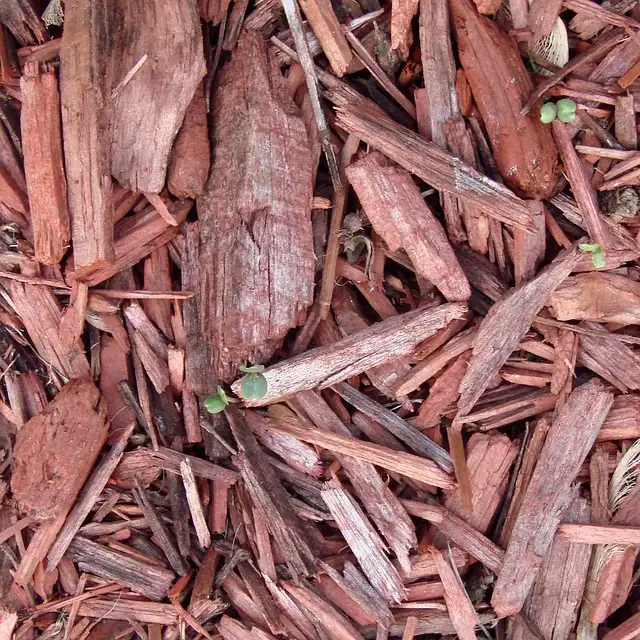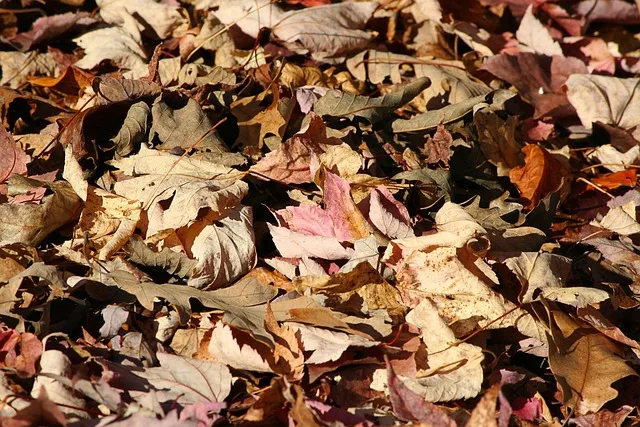When it comes to nurturing a lush and vibrant garden in North Carolina, FortSmith Landscaping understands the unique challenges and opportunities presented by our region’s climate and soil conditions. In the heart of the Tar Heel State, where hot and humid summers are the norm, and where vibrant greenery thrives year-round, achieving and maintaining a beautiful garden can be a rewarding endeavor.
One essential tool in our arsenal for garden success? Mulch. Join our landscaping experts as we delve into the top eight benefits of mulching your Wake Forest garden. We are revealing how this simple yet powerful landscaping technique can help you conserve water, battle stubborn weeds, and create the ideal conditions for flourishing plant life.

What is Mulch?
Mulch is a versatile and invaluable material used in gardening and landscaping to enhance the health and appearance of gardens, flowerbeds, and other cultivated areas. It is typically composed of a variety of materials that make organic mulches or inorganic mulches that are spread over the soil surface. The primary purpose of mulch is to provide a protective layer that offers a wide range of benefits to both plants and the garden environment.
Wood Mulches
Wood chip mulch, crafted from shredded or chipped wood, stands as one of the most popular and versatile options for mulching garden beds. It’s available in various textures and colors, making it a favorite for Wake Forest landscaping aesthetics. Wood chips excel at moisture retention and insulation, making them a go-to choice for gardens in various climates.
Straw or Hay Mulches
Straw or hay mulch is frequently used in gardens, particularly for its effectiveness in weed suppression and soil temperature regulation. Comprising dried straw or hay remnants from agricultural crops, it excels in insulating the soil, crucial in regions with temperature fluctuations. Light and easy to spread, straw and hay mulch makes for a popular choice for vegetable gardens and flower beds.
Compost Mulches
Compost mulch, a dual-purpose option, serves both as a mulch and a soil amendment. Rich in nutrients and organic matter, compost enhances soil fertility, promotes microbial activity, and retains moisture effectively. It’s particularly well-suited for vegetable gardens and flower beds, where nutrient-rich soil is essential for plant health. Compost mulch not only aids in weed control but also contributes to overall soil improvement.

Rock and Gravel Mulches
Rock or gravel mulch, composed of decorative stones, pebbles, or gravel, is an enduring and low-maintenance choice for landscaping and lawn renovation. Its key advantage lies in its exceptional durability, requiring minimal upkeep once installed. One of its standout features is its ability to conserve water by acting as a shield against moisture evaporation. This makes it particularly suitable for arid climates and water-conscious gardeners, as it reduces the need to frequently water your garden.
What Are the Benefits of Mulching Your Garden?
Gardening is a rewarding and fulfilling endeavor, but it often comes with its fair share of challenges. One such challenge is the constant battle against weeds, fluctuating temperatures, and the need to maintain consistent moisture levels in the soil. This is where mulching comes to the rescue.
Mulch, the protective layer applied over the bare soil, is like the unsung hero of the garden, offering a multitude of benefits that not only simplify gardening tasks but also contribute to the overall health and beauty of your outdoor space.
#1 – Moisture Retention
Mulch plays a crucial role in order to retain soil moisture in your garden. When applied properly, mulch forms a protective layer over the soil, reducing the evaporation of water from the ground. This helps to keep the soil consistently moist, which is particularly beneficial in dry or hot climates. By retaining moisture, mulch ensures that your plants and flower gardens have a steady supply of water, reducing the need for frequent watering. This not only conserves water but also helps your garden thrive by preventing drought stress and promoting healthy root development.
#2 – Weed Suppression
One of the most practical benefits of mulching is its ability to suppress weeds. A layer of mulch serves as a natural barrier that inhibits weed growth by blocking sunlight and preventing weed seeds from making contact with the soil. This means less time and effort spent on weeding, as well as a neater and more attractive garden. Through weed control, you reduce competition for nutrients, mulch also allows your plants to flourish without being overwhelmed by invasive weeds.
#3 – Temperature Regulation
Mulch acts as an insulator for your garden soil, helping to regulate soil temperatures. In hot weather, mulch shields the soil from direct sunlight, preventing it from becoming too hot and stressing your plants’ roots. During colder months, mulch provides insulation that helps to keep the soil warmer, protecting your plants’ roots from frost damage. This temperature stability promotes healthier and more robust plant growth throughout the year.
#4 – Soil Erosion Prevention
Erosion can be a significant problem in gardens, particularly in sloped areas or regions with heavy rainfall. Mulch plays a vital role in preventing soil erosion and soil compaction by creating a protective layer that absorbs the impact of rainfall and slows down the flow of water over the soil surface. This prevents soil from washing away and helps maintain the integrity of your garden’s landscape. By reducing erosion, mulch also safeguards against the loss of valuable topsoil and the exposure of plant roots.
#5 – Pest Control
Certain types of mulch, such as cedar or cypress grass clippings, have natural repellent properties that deter pests like insects and rodents. By using these types of mulch, you can create a barrier that discourages unwanted critters from invading your garden. Additionally, mulch can provide a physical barrier that makes it more challenging for pests to access your plants’ roots. This can help reduce the need for chemical pesticides and promote a more eco-friendly approach to pest control in your garden.

#6 – Improved Aesthetics
Beyond its functional benefits, mulch can significantly enhance the visual appeal of your garden. It provides a polished and finished look to flowerbeds, pathways, and around trees. Gardeners can choose from a wide variety of mulch materials, including different colors and textures, to complement their overall garden design.
Whether you prefer the natural look of wood chips, the earthy tones of shredded bark, or the uniformity of stone mulch, there’s an option to suit every garden style. The clean and well-maintained appearance that mulch imparts to your garden can make it a more inviting and inviting space for relaxation and enjoyment.
#7 – Tree and Shrub Protection
Mulching isn’t just for flowerbeds and vegetable gardens; it’s also a vital practice for protecting trees and shrubs. Applying mulch in a donut-like shape around the base of trees and shrubs creates a protective barrier. This mulch collar helps prevent lawnmower and trimmer damage to the bark, which can be detrimental to the health of these plants.
Furthermore, the mulch acts as an insulating layer, helping to regulate soil temperature, retain moisture, and reduce weed competition around trees and shrubs. It creates an ideal environment for these larger plants to thrive, promoting their growth and longevity.
#8 – Easier Maintenance
Mulch significantly simplifies garden maintenance. By getting rid of weeds, it reduces the need for time-consuming and back-breaking weeding tasks. It also helps to maintain consistent soil moisture levels, reducing the frequency of watering required. Additionally, the insulation provided by mulch minimizes temperature fluctuations, which can stress plants and increase maintenance demands.
With less weeding, watering, and temperature-related challenges, you’ll find that mulching your garden makes your gardening tasks more manageable and allows you to enjoy your outdoor space with less effort.
Need Help Mulching Your Garden? Call Our Wake Forest Professionals Today!
Are you ready to experience the multitude of benefits that mulching can bring to your garden? If you’re looking to simplify your gardening tasks, enhance the aesthetics of your outdoor space, and promote healthier plant growth, it’s time to take action. Our dedicated team of landscaping professionals in Wake Forest is here to assist you.
Whether you need guidance on selecting the right mulch for your garden, expert mulch installation, or personalized advice on garden care, we’ve got you covered. Don’t hesitate to reach out to us today and let us help you transform your garden into a flourishing oasis.
Call FortSmith Landscaping now at (919) 228-8495 or contact us by filling out the form below to get started.
